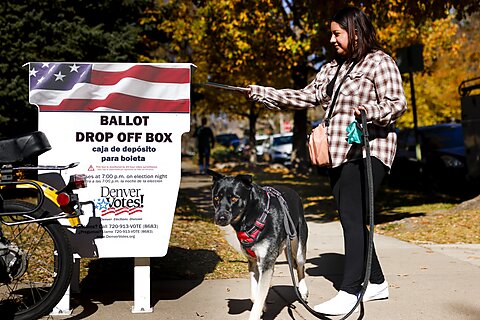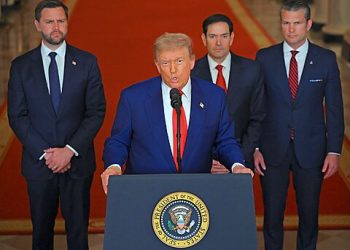Can mail ballots be lawfully accepted after Election Day if they are postmarked on Election Day?
This legal question came up 10 days ago when Federal District Court Judge Denise Casper enjoined parts of President Trump’s March 25, 2025 executive order on election administration.
Judge Casper is not the first to rule against the president’s election executive order.
On April 24, Judge Colleen Kollar-Kotelly enjoined a number of the executive order’s provisions, including, most significantly, the requirement of documented proof of citizenship to register to vote (see my previous Cato post on that ruling).
Judge Casper agreed with Judge Colleen Kollar-Kotelly regarding documented proof of citizenship.
But Judge Casper went further and also enjoined section 7(a) of the president’s executive order, which sought to prevent states from accepting mail ballots after election day:
“The Attorney General shall take all necessary action to enforce 2 U.S.C. 7 and 3 U.S.C. 1 against States that violate these provisions by including absentee or mail-in ballots received after Election Day in the final tabulation of votes for the appointment of Presidential electors and the election of members of the United States Senate and House of Representatives.”
Currently, every state requires that voters complete, as in, fill out their ballots by Election Day.
However, many states allow mail ballots to arrive after Election Day so long as they are postmarked by Election Day: Alaska, California, Illinois, Kansas, Maryland, Massachusetts, Mississippi, Nevada, New Jersey, New York, North Dakota, Ohio, Oregon, Texas, Virginia, Washington, and West Virginia.
President Trump’s executive order calls attention to a fractured legal question.
On October 25, 2024, the Fifth Circuit ruled that Mississippi’s return policy was preempted by federal law. Under Mississippi law, mail ballots must be “postmarked on or before the date of the election and received by the registrar no more than five (5) business days after the election.”
But according to the Fifth Circuit, this Mississippi law was inconsistent with the federal definition of “the day for the election.”
“The State’s problem is that it thinks a ballot can be ‘cast’ before it is received. What if a State changes its law to allow voters to mark their ballots and place them in a drawer? Or what if a State allowed a voter to mark a ballot and then post a picture on social media? The hypotheticals are obviously absurd. But it should be equally obvious that a ballot is ‘cast’ when the State takes custody of it.
“Second, finality. The Supreme Court has said ‘the word [election] now has the same general significance as it did when the Constitution came into existence—final choice of an officer by the duly qualified electors.’ Newberry v. United States, 256 U.S. 232, 250 (1921). An election involves more than government action; it also involves the polity’s final choice of an officeholder.
“A voter’s selection of a candidate differs from the public’s election of the candidate. Officials tally each voter’s selection and then declare a winner of the election. Those are the not (sic) the same thing. And while an individual voter might be able to make his or her selection in private, alone, it makes no sense to say the electorate as a whole has made an election and finally chosen the winner before all voters’ selections are received.”
This ruling departed from rulings from other jurisdictions, as well as the trend of state legislatures, more and more of which had been allowing mail ballots postmarked by Election Day to be counted as valid even if received after Election Day (see above).
In Bost v. Ill. State Bd. of Elections, the US District Court for the Northern District of Illinois considered Illinois law that “allows ballots cast in federal elections to be received and counted for up to 14 days after Election Day, so long as the ballot was postmarked or certified on or before Election Day.” It noted that “[s]tates have wide discretion to establish the time, place, and manner of” their elections, and ruled that “wide discretion broad deference that Congress found that the “Ballot Receipt Deadline Statute operates harmoniously with the federal statutes that set the time for federal elections.”
The Bost ruling came out in July 2023. The Federal District Court for the District of New Jersey had ruled similarly in October 2020, noting that states have “wide discretion in the formulation of a system for the choice by the people of representatives.”
Returning to the present day, Judge Casper’s ruling from mid-June focused more on whether the president had the authority to dictate ballot receipt deadlines. She ruled he likely did not.
But Judge Casper also issued commentary that the district courts of Illinois and New Jersey likely had it right and that the Fifth Circuit had it wrong. That is, states can choose if they want to permit the receipt of ballots after Election Day, so long as they are postmarked by Election Day.
As a matter of policy, I agree with President Trump that states should require that ballots be received by election offices by Election Day. Voting has never been more accessible—most states now allow no-excuse vote-by-mail, no-excuse early voting, as well as in-person Election Day voting. The benefit of tacking on a few extra days for procrastinators is outweighed by the damage done by the prolonged suspense of knowing the winners of close elections.
But as a matter of law, I don’t know where the courts will go. I just know that state legislatures and election officials will want to know the law in plenty of time for the 2026 midterm elections.
















